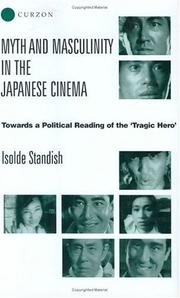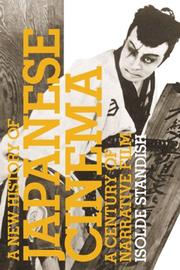| Listing 1 - 5 of 5 |
Sort by
|
Book
ISBN: 9780826444707 9780826439017 Year: 2011 Publisher: New York, N.Y. Continuum
Abstract | Keywords | Export | Availability | Bookmark
 Loading...
Loading...Choose an application
- Reference Manager
- EndNote
- RefWorks (Direct export to RefWorks)
Film --- anno 1970-1979 --- anno 1960-1969 --- Japan --- film --- filmtheorie --- filmgeschiedenis --- twintigste eeuw --- cultuurgeschiedenis --- kunst --- filmregisseurs --- Oshima Nagisa --- Imamura Shohei --- Yoshida Yoshishige --- Hani Susumu --- Wakamatsu Koji --- Okamoto Kihachi --- 791.43 --- Experimental films --- Motion pictures --- History --- Political aspects --- Cinema --- Feature films --- Films --- Movies --- Moving-pictures --- Audio-visual materials --- Mass media --- Performing arts --- Avant-garde films --- Experimental videos --- Personal films --- Underground films --- Video art --- History and criticism --- J6839 --- Japan: Media arts and entertainment -- cinema
Book
Year: 2006 Publisher: London ; New York : Continuum,
Abstract | Keywords | Export | Availability | Bookmark
 Loading...
Loading...Choose an application
- Reference Manager
- EndNote
- RefWorks (Direct export to RefWorks)
ART / Film & Video. --- Motion pictures --- PERFORMING ARTS / Film & Video / Reference. --- History

ISBN: 0700712917 Year: 2000 Publisher: London Curzon
Abstract | Keywords | Export | Availability | Bookmark
 Loading...
Loading...Choose an application
- Reference Manager
- EndNote
- RefWorks (Direct export to RefWorks)

ISBN: 1628929197 1283206625 9786613206626 1441161546 9781441161543 9781283206624 9781628929195 0826417906 9780826417909 0826417094 9780826417091 Year: 2005 Publisher: New York ; London : Continuum,
Abstract | Keywords | Export | Availability | Bookmark
 Loading...
Loading...Choose an application
- Reference Manager
- EndNote
- RefWorks (Direct export to RefWorks)
"In A New History of Japanese Cinema Isolde Standish focuses on the historical development of Japanese film. She details an industry and an art form shaped by the competing and merging forces of traditional culture and of economic and technological innovation. Adopting a thematic, exploratory approach, Standish links the concept of Japanese cinema as a system of communication with some of the central discourses of the twentieth century: modernism, nationalism, humanism, resistance, and gender. After an introduction outlining the earliest years of cinema in Japan, Standish demonstrates cinema's symbolic position in Japanese society in the 1930s--as both a metaphor and a motor of modernity. Moving into the late thirties and early forties, Standish analyses cinema's relationship with the state-focusing in particular on the war and occupation periods. The book's coverage of the post-occupation period looks at "romance" films in particular. Avant-garde directors came to the fore during the 1960s and early seventies, and their work is discussed in depth. The book concludes with an investigation of genre and gender in mainstream films of recent years. In grappling with Japanese film history and criticism, most western commentators have concentrated on offering interpretations of what have come to be considered "classic" films. A New History of Japanese Cinema takes a genuinely innovative approach to the subject, and should prove an essential resource for many years to come."--Bloomsbury Publishing.
Motion pictures --- History. --- History

ISBN: 9780826417909 0826417094 9780826417091 0826417906 Year: 2006 Publisher: New York Continuum
Abstract | Keywords | Export | Availability | Bookmark
 Loading...
Loading...Choose an application
- Reference Manager
- EndNote
- RefWorks (Direct export to RefWorks)
This volume addresses the historical development of Japanese cinema, and the confluence of traditional arts, sociopolitical trends, and Western technology. Previous studies of Japanese cinema concentrated on stylistic development, or on a particular era; but Standish (film studies, School of Oriental and African Studies, U. of London) discusses the subject in terms of modernity and the Shochiku Tokyo Studios, nationalism and empire, the state, humanism, transgression, and genres and.
| Listing 1 - 5 of 5 |
Sort by
|

 Search
Search Feedback
Feedback About UniCat
About UniCat  Help
Help News
News